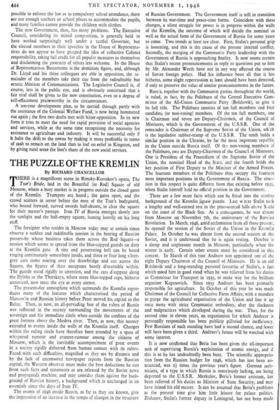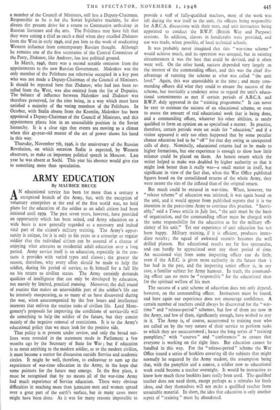THE PUZZLE OF THE KREMLIN
By RICHARD CHANCELLOR
THERE is a magnificent scene in Rimsky-Korsakov's opera, The Tsar's Bride, laid in the Beautiful (or Red) Square of old Moscow, where a busy market is in progress outside the closed gates of the Kremlin. Trumpets are heard ; the gates open, and the crowd scatters in terror before the men of the Tsar's bodyguard, who bound forward, curved swords half-drawn, to clear the square for their master's passage. Ivan IV of Russia emerges slowly into the sunlight and the half-empty square, leaning heavily on his long staff.
The foreigner who resides in Moscow today may at certain times observe a sudden and indefinable tension in the bearing of Russian passers-by whose business takes them across the Red Square—a tension which seems to spread from the blue-capped guards on duty at the Kremlin gate. A tiny and penetrating bell can be heard ringing continuously somewhere inside, and three or four long silver- grey cars come roaring over the drawbridge and out across the Square, the figures of their occupants barely discernible within. The guards stand rigidly to attention, and the cars disappear along the Ilyinka or the Tberstaya, where more blue-topped caps, hitherto unnoticed, now meet the eye at every corner.
The present-day atmosphere which surrounds the Kremlin repro- duces many of the features which characterised the period of Muscovite and Russian history before Peter moved his capital to the Baltic. Then, as now, an all-pervading fear of the rulers of Russia was reflected in the secrecy surrounding the movements of the sovereign and his immediate circle when outside the confines of the great fortress above the Moskva river. Then, as now, this secrecy extended to events inside the walls of the Kremlin itself. Changes within the ruling circle have therefore been attended by a spate of whispered rumour and counter-rumour among the citizens of Moscow, which is the inevitable accompaniment of great events in a society rigidly debarred from human contact with its rulers. Faced with such difficulties, magnified as they are by distance and by the lack of uncensored newspaper reports from the Russian capital, the Western observer must make the best deductions he can from such facts and statements as are released by the Soviet news and propaganda machine. and may consider them against the back- ground of Russian history, a background which is unchanged in its essentials since the days of Ivan IV.
The events of 1946 inside Russia, as far as they are known, give the impression of an increase in the tempo of changes in the structure of Russian Government. The Government itself is still in transition between its war-time and peace-time forms. Coincident with these changes, a silent struggle for power is in progress within the walls of the Kremlin, the outcome of which will decide the nominal as well as the actual form of the Government of Russia for some years to come. Two trends at least are clear. First, Stalin's personal grip is loosening, and this is the cause of the present internal conflict. Secondly, the merging of the Communist Party leadership with the Government of Russia is approaching finality. It now seems certain that Stalin's recent pronouncements in reply to questions put to him by Mr. Alexander Werth have not in any way affected the course of Soviet foreign policy. Had his influence been all that it has hitherto, some slight repercussion at least should have been detected, if only to preserve the value of similar pronouncements in the future.
Russia, together with the Communist parties throughout the world, is ruled, in fact, by the Politburo of the Central Executive Com- mittee of the All-Union Communist Party (Bolshevik), to give it its full title. The Politburo consists of ten full members and four candidate (or non-voting) members. Of the ten full members, one is Chairman and seven are Deputy-Chairmen, of the Council of Ministers, which is the Government of the U.S.S.R. One of the remainder is Chairman of the Supreme Soviet of the Union, which is the legislative rubber-stamp of the U.S.S.R. The tenth holds a similar position in the Ukraine, by far the most important republic in the Union outside Russia itself. Of the non-voting members of the Politburo, two are Deputy-Chairmen of the Council of Ministers. One is President of the Praesidium of the Supreme Soviet of the Union, the nominal Head of the State, and the fourth holds the key position of First Deputy to the Minister of the Armed Forces. The fourteen members of the Politburo thus occupy the fourteen most important positions in the Government of Russia. The situa- tion in this respect is quite different from that existing before 1941, when Stalin himself held no official position in the Government.
There are a few more facts which can be fitted into the sombre background of the Kremlin jigsaw puzzle. Last winter Stalin took a lengthy and well-earned rest in the pine-scented hills above Sochi on the coast of the Black Sea. As a consequence, he was absent from Moscow on November 7th, the anniversary of the Russian Revolution. In March, 1946, amid acclamation from all those present, he opened the session of the Soviet of the Union in the Kremlin Palace. In October he was absent from the second session of the Soviet, and it is understood that he is again resting. October is a damp and unpleasant month in Moscow, particularly when the winter is early. Certain other events must be considered in this context. In March of this year Andreev was appointed one of the eight Deputy Chairmen of the Council of Ministers. He is an old Bolshevik and a long-standing personal favourite of Stalin's, a fact which stood him in good stead when he was relieved from his duties as Commissar for Transport in 1935, to make way for the brilliant organiser Kaganovich. Since 1935 Andreev has been primarily responsible for agriculture. In October of this year he was made Chairman of the Council for Collective Farm Affairs, with a mandate to purge the agricultural organisation of the Union and line it up once more with strict Communist orthodoxy, after the slackness and malpractices which developed during the war. Thus, for the second time in eleven years, an organisation for which Andreev is personally responsible has been publicly pilloried for inefficiency. Few Russians of such standing have had a second chance, and fewer still have been given a third. Andreev's future will be watched with some interest.
It is now confirmed that Beria has been given the all-important task of supervising Russia's exploitation of atomic energy, and if this is so he has undoubtedly been busy. The scientific appropria- tion from the Russian budget for 1946, which has just been an- nounced, was 21 times the previous year's figure. German tech- nicians, of a type in which Russia is notoriously lacking, are being deported to the U.S.S.R. Merkulov, Beria's former assistant, has been relieved of his duties as Minister of State Security, and may have joined his old master. It can be assumed that Beria's problems at the present time give him little leisure for palace politics. Zhdanov, Stalin's former deputy in Leningrad, has not been made
a member of the Council of Ministers, still less a Deputy-Chairman. Responsible as he is for the Soviet legislative machine, he also directs the present drive for a return to Communist orthodoxy in Russian literature and the arts. The Politburo may have felt that they were setting a thief to catch a thief when they recalled Zhdanov from the West in early 1946, and put him to the work of eradicating Western influence from contemporary Russian thought. Although he remains one of the five secretaries of the Central Committee of the Party, Zhdanov, like Andreev, has lost political ground.
In March, 1946, there was a second notable omission from the appointments to the new Russian Government. Malenkov was the only member of the Politburo not otherwise occupied in a key post who was not made a Deputy-Chairman of the Council of Ministers. It should be repeated here that Zhdanov, who had just been re- called from the West, was also omitted from the list of Deputies. The balance of influence between Malenkov and Zhdanov was therefore preserved, for the time being, in a way which must have satisfied a majority of the voting members of the Politburo. In October, with Stalin absent from the Kremlin, Malenkov has been appointed a Deputy-Chairman of the Council of Ministers, and this appointment places him in an unassailable position in the Soviet hierarchy. It is a clear sign that events are moving to a climax when this 45-year-old master of the art of power shows his hand in this way.
Thursday, November 7th, 1946, is the anniversary of the Russian Revolution, on which occasion Stalin is expected, by Western observers, to make an important political speech in Moscow. Last year he was absent at Sochi. This year his absence would give rise to something more than speculation.



































 Previous page
Previous page